Research Papers/Articles
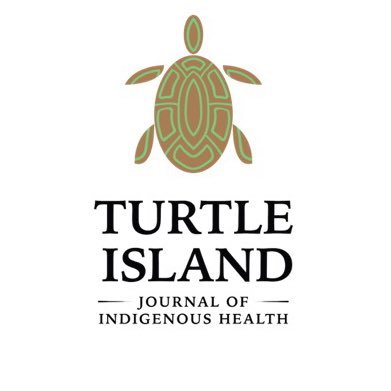
Indigenous Epistemologies, Worldviews and Theories of Power
2020
Author(s): Hickey D
This paper argues that understanding more about epistemologies of power will help illuminate a pathway by which Indigenous Peoples and Canadians of settler ancestry can better understand one another, creating the shift in these relationships that is required in order to gather large-scale support for reconciliation and for ethical distribution of power resources in Canada.
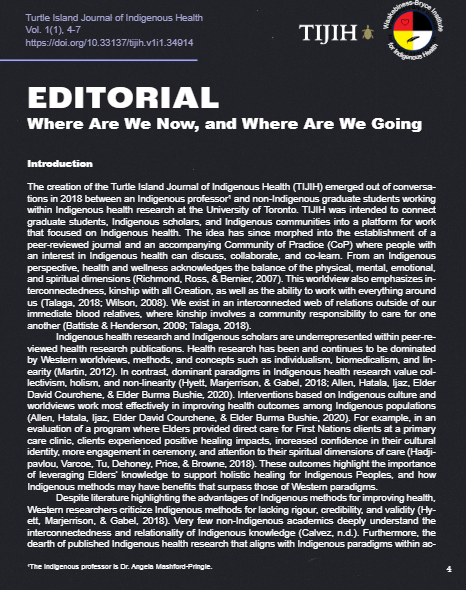
Editorial: Where Are We Now, and Where Are We Going
2020
Author(s): Monteith H, Tan S
Indigenous health research and Indigenous scholars are underrepresented within peer-re-viewed health research publications. Health research has been and continues to be dominated by Western worldviews, methods, and concepts such as individualism, bio medicalism, and linearity (Martin, 2012). In contrast, dominant paradigms in Indigenous health research value collectivism, holism, and non-linearity (Hyett, Marjerrison, & Gabel, 2018; Allen, Hatala, Ijaz, Elder David Courchene, & Elder Burma Bushie, 2020). Interventions based on Indigenous culture and worldviews work most effectively in improving health outcomes among Indigenous populations (Allen, Hatala, Ijaz, Elder David Courchene, & Elder Burma Bushie, 2020). For example, in an evaluation of a program where Elders provided direct care for First Nations clients at a primary care clinic, clients experienced positive healing impacts, increased confidence in their cultural identity, more engagement in ceremony, and attention to their spiritual dimensions of care (Hadji-pavlou, Varcoe, Tu, Dehoney, Price, & Browne, 2018). These outcomes highlight the importance of leveraging Elders’ knowledge to support holistic healing for Indigenous Peoples, and how Indigenous methods may have benefits that surpass those of Western paradigms.
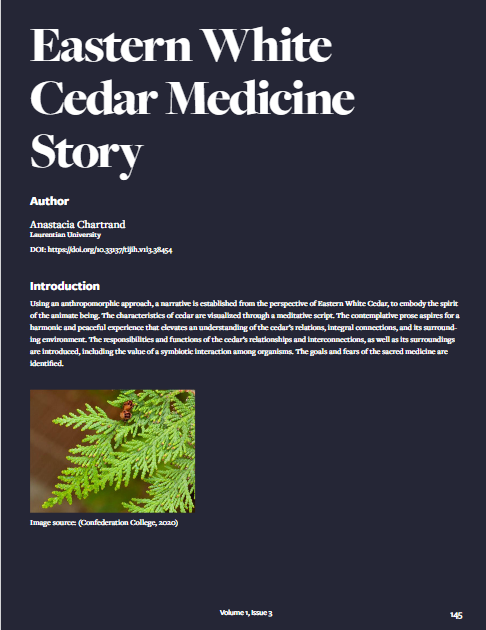
Nature’s kindness is vast and abundant, always available to assist and support, even when threatened. The interpretation of the Cedar story can remind us of the interconnectedness of all things on Earth and leave us feeling compelled to live in harmony with the Earth on a visceral level.
Growing in relation with the land: Experiential learning of Root and Regenerate Urban farms
2023
Author(s): Rozanski C,Gavin M
This paper discusses the benefits and limitations of Small Plot Intensive Farming methods and urban land-sharing strategies, as well as the viability of land-based urban agriculture in a rapidly changing socio-ecological climate and also demonstrates the potential for transcending siloed approaches to knowledge-making vis-Ă -vis experiential learning partnerships between graduate student researchers, farmers, and agricultural organizations.
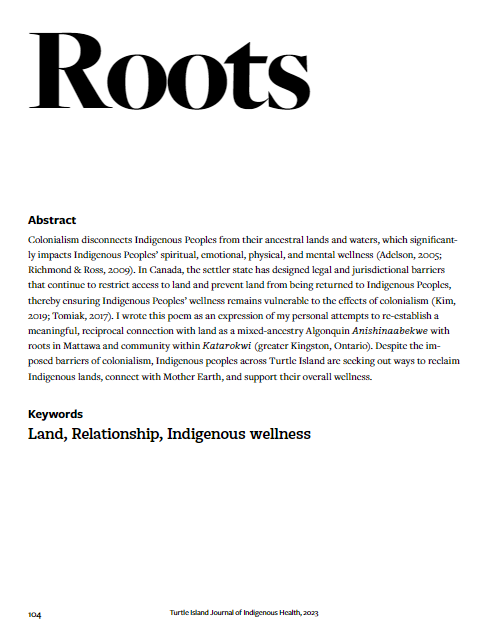
This peom was written as an expression of my personal attempts to re-establish a meaningful, reciprocal connection with Land as a mixed-ancestry Algonquin Anishinaabe ikwe with roots in Mattawa/North Bay and community within Katarokwi. Despite the imposed barriers of colonialism, Indigenous Peoples across Turtle Island are seeking out ways to reclaim Indigenous lands, connect with Mother Earth, and support their overall wellness
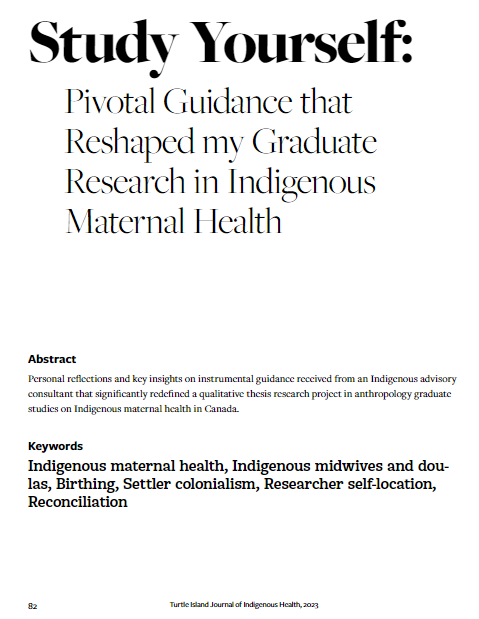
Study Yourself: Pivotal Guidance that Reshaped my Graduate Research in Indigenous Maternal Health
2023
Author(s): Tomkins S
The term “Indigenous” was used to reflect shared maternal health experiences, which reveal the continued marginalization of First Nations, Inuit, and Métis women and birthing parents by settler colonial systems in Canada, the resistance against this oppression, and the efforts to restore safety and autonomy in Indigenous maternal health.
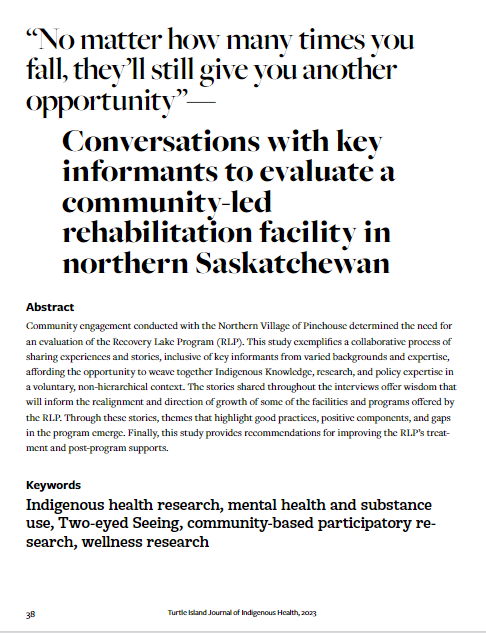
“No matter how many times you fall, they’ll still give you another opportunity” – Conversations with Key Informants to Evaluate a Community-led Rehabilitation Facility in Northern Saskatchewan
2023
Author(s): Froehlich J, Smith J, Iyer S, Ametepee K, Smith K, Foshion V, Smith W, Mease A, King A, King M
The study exemplifies a collaborative process of sharing experiences and stories, inclusive of key informants from varied backgrounds and expertise, affording the opportunity to weave together Indigenous knowledge, research and policy expertise in a voluntary, non-hierarchical context.
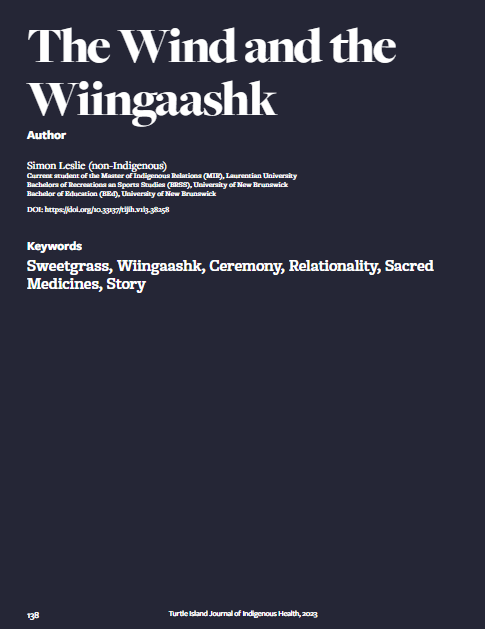
With a focus on kindness and healing, the story and the subsequent poem look to a future that ventures to care for the earth and for others in a holistic way.
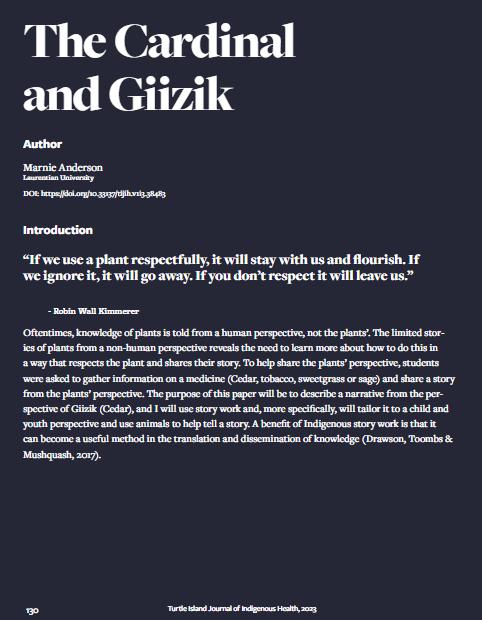
The purpose of this paper will be to describe a narrative from the perspective of Giizik (Cedar) and I will use story work and more specifically will tailor it to a child and youth perspective. A benefit of Indigenous story work is it can become a useful method in the translation and dissemination of knowledge (Drawson, Toombs & Mushquash, 2017)
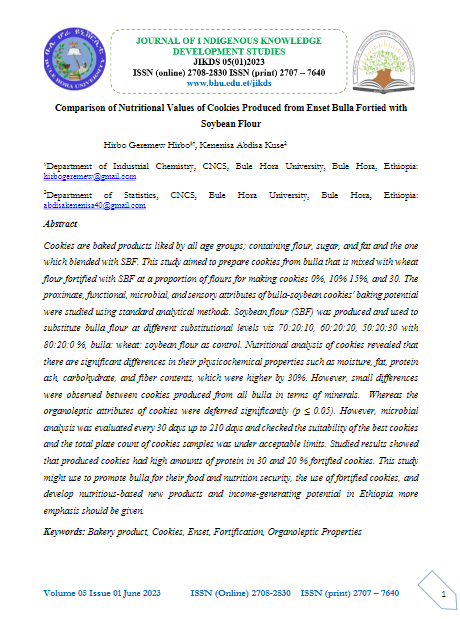
Comparison of Nutritional Values of Cookies Produced from Enset Bulla Fortied with Soybean Flour
2023
Author(s): GeremewHirbo H , Kuse KA
However, small differences were observed between cookies produced from all bulla in terms of minerals.The studied results showed that produced cookies had high amounts of protein in 30% and 20% fortified cookies.



